|
|
|
Sort Order |
|
|
|
Items / Page
|
|
|
|
|
|
|
| Srl | Item |
| 1 |
ID:
086296
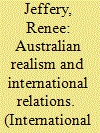

|
|
|
|
|
| Publication |
2008.
|
| Summary/Abstract |
John Anderson, Professor of Philosophy at the University of Sydney from 1927 to 1958, is not conventionally viewed as having exerted a significant influence on the development of international relations in the 20th century. Indeed, his contributions to philosophical realism and public debate in Australian society have been more readily acknowledged as his major spheres of influence. However, Anderson must also be credited with having exerted a significant influence on the intellectual development of one of the most prominent international relations theorists of the 20th century, his student Hedley Bull. With this in mind, this article assesses the impact of Anderson's teachings on Bull's thought and argues that although Bull deviated from his earliest mentor's more extreme views about ethical inquiry, his general approach to the study of international relations, understanding of international society, and sceptical attitude towards religion can, in large part, be derived from Anderson's teachings.
|
|
|
|
|
|
|
|
|
|
|
|
|
|
|
|
| 2 |
ID:
120210
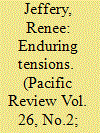

|
|
|
|
|
| Publication |
2013.
|
| Summary/Abstract |
From 1998 to 2003, the Solomon Islands found itself in the grip of 'the Tensions', a violent civil conflict that left some 200 people dead, more than 20,000 displaced, and countless others subjected to torture, rape, fear and intimidation. In the aftermath of the conflict, two dominant approaches to post-conflict justice emerged. The first, implemented by the Regional Assistance Mission to the Solomon Islands (RAMSI), favoured a 'rule of law' approach according to which large numbers of militants on both sides were arrested and processed through the criminal justice system resulting, in many cases, in the imposition of lengthy period of imprisonment. The second, 'reconciliation' approach, favoured local, grassroots, traditional and indigenous justice processes and were routinely implements by community groups, women's organisations and the churches. This article demonstrates that in the absence of a formally planned transitional justice process, these two approaches to post-conflict justice have come into serious tension with proponents of each accusing the other of hampering their justice efforts. It examines those tensions and analyses the extent to which the Solomon Islands' Truth and Reconciliation Commission, designed in part to provide a bridge between the rule of law and reconciliation approaches, has been able to quell this new set of tensions.
|
|
|
|
|
|
|
|
|
|
|
|
|
|
|
|
| 3 |
ID:
138159
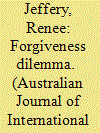

|
|
|
|
|
| Summary/Abstract |
In post-conflict politics, forgiveness is as controversial as it is popular. Generally conceived as the overcoming of negative moral emotions such as resentment and anger, forgiveness is, on the one hand, credited with bestowing significant psychological benefits on its practitioners, contributing to processes of interpersonal and societal reconciliation, and avoiding revenge. On the other hand, however, critics warn that rather than helping to address the negative emotions, forgiveness actually helps to provoke resentments and grievances by heaping injustice upon injustice. Herein lies the dilemma with which this article is concerned. By examining the nature of the negative emotions and their relationship to the pursuit of justice, as well as the nature and consequences of forgiveness, it considers the role that victim participation in human rights trials plays in helping post-conflict societies to overcome the forgiveness dilemma. To do so, it focuses on Case 001, heard before the Extraordinary Chambers in the Courts of Cambodia.
|
|
|
|
|
|
|
|
|
|
|
|
|
|
|
|
| 4 |
ID:
104058
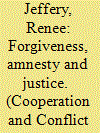

|
|
|
|
|
| Publication |
2011.
|
| Summary/Abstract |
The practice of forgiveness in processes of conflict resolution and post-conflict justice is confronted by two sets of serious criticisms. First, scholars and practitioners alike have questioned whether or not the fundamentally interpersonal practice of forgiveness can be readily and legitimately transposed to broader socio-political contexts. Second, questions have also been raised concerning the potential for forgiveness, particularly when associated with amnesties, to jeopardize and even circumvent the application of justice in post-conflict contexts. By contrast, supporters argue that forgiveness is not only possible but necessary in politics and, by drawing a distinction between amnesties and forgiveness, and restorative and retributive forms of justice, that forgiveness contributes to the achievement of restorative justice. By analysing the role that forgiveness is playing in bringing almost two decades of conflict between the Lord's Resistance Army and the Ugandan government to an end, this article demonstrates that a disjuncture exists between the theoretical treatment of forgiveness and the practice of political forgiveness. That is, it demonstrates, contrary to arguments made by both its supporters and critics, that political forgiveness, even when conceived in conjunction with amnesties, may contribute to both restorative and retributive forms of justice.
|
|
|
|
|
|
|
|
|
|
|
|
|
|
|
|
| 5 |
ID:
071777
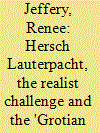

|
|
|
|
|
| Publication |
2006.
|
| Summary/Abstract |
This article argues that although he is ordinarily relegated to the realm of international legal scholarship, Hersch Lauterpacht made a significant contribution to the development of International Relations theory. In particular, it demonstrates that in attempting to address the range of debates surrounding the relationship between law and morality in the interwar and postwar eras, Lauterpacht not only engaged directly with E.H. Carr's criticisms of 'utopian' thought but was responsible for providing the most comprehensive expression of the 'Grotian tradition' to date, a tradition that later appeared in the works of Martin Wight and subsequent scholars. In doing so, this article seeks to achieve not only Lauterpacht's reincorporation into the history of International Relations scholarship but brings into question the disciplinary demarcations that divide the so-called 'disciplines' of International Relations and International Law.
|
|
|
|
|
|
|
|
|
|
|
|
|
|
|
|
| 6 |
ID:
143921
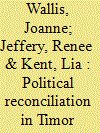

|
|
|
|
|
| Summary/Abstract |
In recent years, the study and practice of political reconciliation has experienced a turn to hybridity. This turn has been defined by the increased rate at which liberal international and local peacebuilding practices, and their underlying ideas, have become merged, integrated or co-located in time and space. While hybrid approaches to reconciliation have been praised as an effective means of engaging local populations in peacebuilding operations, little attention has been paid to examining whether or not they also bring unintended negative consequences. Drawing on the cases of Timor Leste, Solomon Islands and Bougainville, this article examines the potentially dark side of hybridity. It demonstrates that, in each of these cases, hybrid approaches to political reconciliation have brought both positive and negative consequences. On the positive side of the equation, hybridity has seen imported international approaches to reconciliation adapted to meet local demands and ensure resonance with local populations. On the negative side, however, the misappropriation and instrumentalisation of local practices within hybrid approaches has served to damage their legitimacy and to jeopardise their contributions to reconciliation. The article thus concludes that the existence and extent of this dark side necessitates a re-evaluation of how hybrid approaches to political reconciliation are planned and implemented.
|
|
|
|
|
|
|
|
|
|
|
|
|
|
|
|
|
|
|
|
|